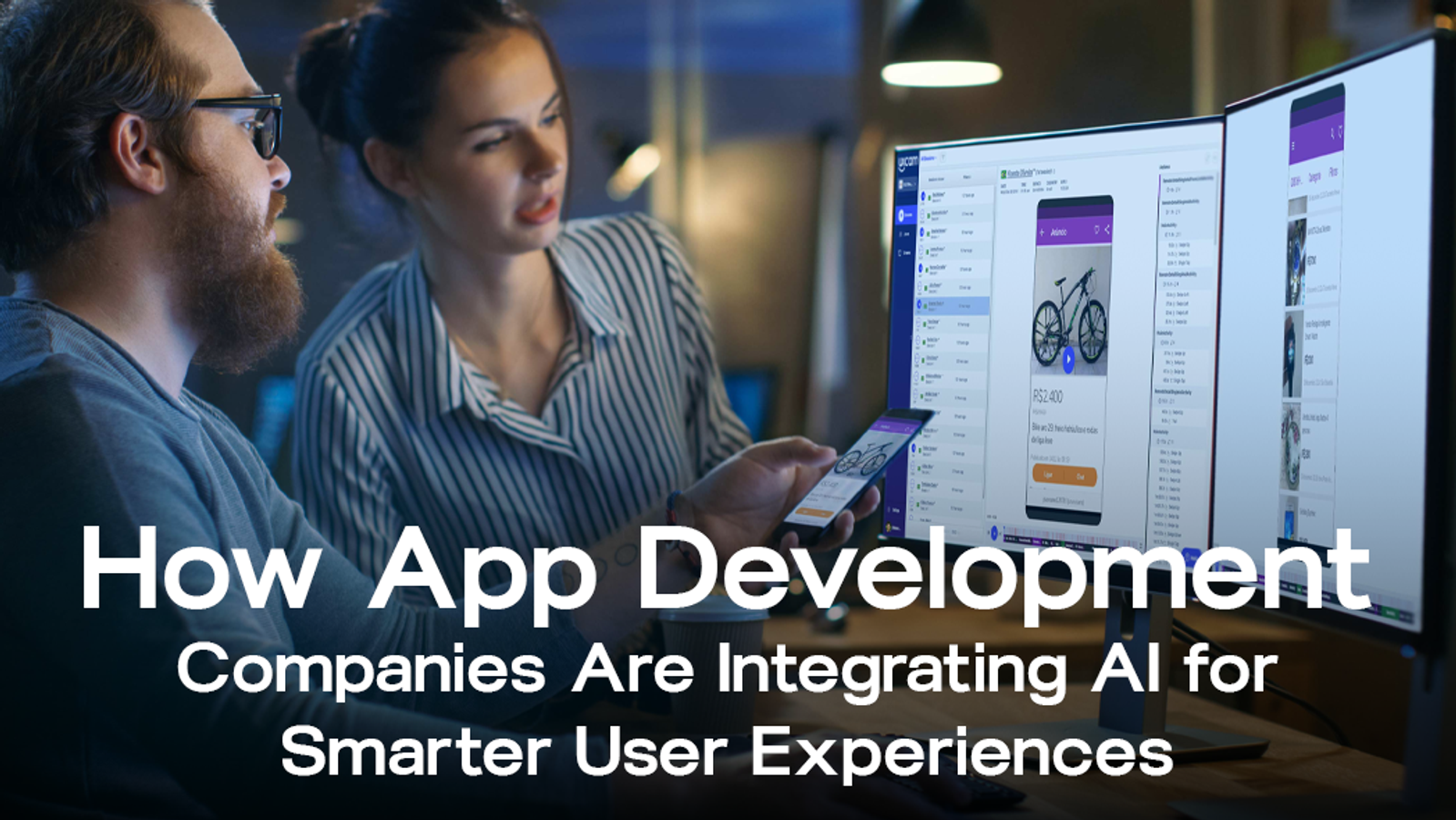Published: August 17, 2025 | By Alfie Carter

Introduction
Artificial Intelligence (AI) is not just a buzzword anymore—it's a core technology that’s transforming the way users interact with digital products. In 2025, app development companies are no longer building basic functionality alone; they’re integrating AI at every level to create seamless, predictive, and personalized user experiences. From voice recognition to adaptive UI, AI is becoming a critical part of app design. In this article, we’ll explore how top app development companies, especially in the UK, are leveraging AI to enhance user experience (UX) and why your business should embrace these innovations. We’ll also look at real-life use cases, emerging tools, and future trends to help you stay ahead.
Why AI Matters in App Development
- Personalization at Scale
AI enables apps to adapt in real time based on user preferences, behavior, and history. Think Netflix’s recommendation engine or Spotify’s personalized playlists—AI customizes the experience for every user. - Smarter Decision-Making
AI-driven analytics allow apps to provide insights and suggest actions, creating a more engaging and useful experience. For instance, finance apps use AI to forecast expenses or suggest savings strategies based on income trends. - Automation of Repetitive Tasks
Chatbots, voice assistants, and predictive search reduce user effort and improve engagement. AI enables apps to understand intent and perform background actions efficiently, improving speed and reducing friction. - Reduced Cognitive Load
With AI-driven interfaces, users can interact with apps more intuitively. AI systems predict what users need before they ask, simplifying navigation and boosting satisfaction. - Continuous Learning and Improvement
Unlike static systems, AI models can learn from user data and optimize the app experience over time. This ongoing evolution ensures the app stays relevant.
Real-World Applications of AI in User Experience
- AI-Powered Chatbots and Virtual Assistants
Modern customer service bots understand natural language, sentiment, and context, thanks to NLP (Natural Language Processing). App developers now embed these tools directly into apps, providing 24/7 support and self-service experiences. These chatbots reduce costs, speed up responses, and keep users engaged longer. - Voice and Image Recognition
Apps like Google Lens or Siri use AI to process images and voice commands. App developers are using tools like Google Cloud Vision and OpenAI Whisper to make apps more interactive and hands-free. In banking apps, users can authenticate via face recognition, while in fitness apps, AI tracks posture or workout form via video. - AI-Based Personalization Engines
E-commerce and content platforms integrate personalization engines that recommend products or media based on a user’s unique preferences. These engines continuously learn from interactions and optimize experiences in real-time. Retail apps, for instance, can recommend entire outfits based on shopping history and style choices. - Predictive Text and Smart Replies
Messaging apps integrate machine learning models to suggest quick replies or auto-complete sentences based on the context of a conversation. Gmail and WhatsApp have successfully implemented these features to increase communication efficiency. - User Behavior Analytics
Heatmaps, scroll maps, and click predictions powered by AI help app developers redesign UI/UX to make user journeys smoother. AI can detect where users struggle and suggest changes to layout, flow, or features. - Health and Wellness Applications
In healthcare and fitness apps, AI predicts health trends based on inputs like vitals, sleep patterns, and nutrition. This enhances UX by offering proactive insights, reminders, and coaching. - Context-Aware Interfaces
AI adapts the app’s interface based on the user's environment (e.g., dark mode at night, simplified UI when distracted), providing a contextually relevant experience.
Tools and Frameworks Enabling AI in App Development
- TensorFlow Lite
Optimized for mobile, enabling deep learning on edge devices. - Core ML (Apple)
Used for image recognition, natural language processing, and custom ML models on iOS. - Dialogflow
For creating conversational UIs like voice bots and chatbots. - Firebase ML Kit
Google's mobile SDK offering easy-to-use APIs for image labeling, text recognition, and more. - Amazon Lex and Polly
For building speech-enabled apps and delivering lifelike voice interactions. - Microsoft Azure AI Services
Offering a wide range of cognitive APIs from vision to speech.
Benefits for Businesses
- Higher User Retention Rates
Personalized content keeps users engaged longer and encourages frequent usage. - Increased Revenue
Intelligent product suggestions and streamlined UX lead to higher conversions. - Reduced Support Costs
AI-powered chatbots handle repetitive queries, freeing up human agents. - Better User Insights
AI-driven analytics provide in-depth data for product improvement. - Competitive Advantage
Apps with intelligent features stand out in crowded markets. - Faster Time to Market
AI can automate testing, user feedback analysis, and iterations, leading to faster launch cycles.
Why Partner with an AI-Integrated App Development Company
Not all developers are trained in AI integration. Partnering with a company like ShazamTechs ensures:
- Custom AI model development tailored to your business case
- Seamless backend and API integration for efficiency
- Scalable solutions across platforms (iOS, Android, Web)
- Compliance with privacy regulations like GDPR
- Ongoing maintenance and performance tuning
With our UK-based team, we offer localized support and global innovation, bridging the gap between your vision and AI-driven execution.
Future Trends: What to Expect Beyond 2025
- Generative AI for UI/UX
Tools that auto-generate interface layouts based on user input, reducing design time. - Emotion-Aware AI
Apps that adapt tone and responses based on user sentiment, creating more human-like interactions. - Augmented Reality with AI
Real-time scene understanding for immersive shopping, real estate, and gaming experiences. - Edge AI
On-device AI processing without internet dependency, boosting speed and privacy. - Explainable AI (XAI)
AI models that explain their reasoning, improving user trust and transparency.
Conclusion
AI is no longer optional in app development—it’s the secret ingredient for creating apps that users love. From personalization to automation and predictive UX, integrating AI elevates your app’s potential. As a leading UK-based app development company, ShazamTechs.com helps businesses transform their ideas into intelligent digital experiences. Whether you’re building a new app or upgrading an existing one, AI is the tool that will set you apart.